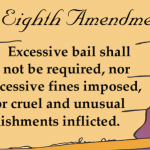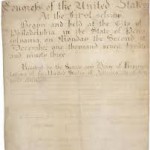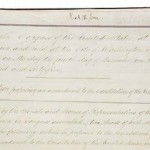The Eighth Amendment to the US Constitution is part of the Bill of Rights. Along with the Fourth, Fifth and Sixth Amendments it recognizes procedural rights for persons accused of crimes. The purpose of these procedural rights is to protect an individual’s inalienable natural right to liberty. When originally ratified in 1791, the Bill of […]
The Seventh Amendment: Right to a Jury in Federal Civil Trials
The Founding Fathers had a healthy fear of government power. They relied upon citizen juries to check that power. The suspension of jury trials was one of Declaration of Independence grievances against King George. The Constitution’s 7th Amendment reflects colonial history and beliefs. John Adams described the place of the jury in the system of […]
Fourth Amendment Victory: Cell Phones Cannot be Searched Without a Warrant
In an age of NSA surveillance, secret courts issuing secret warrants, IRS officials allowing private data to be made public and more, it is important to take notice when the Supreme Court steps up and unanimously limits government intrusions in line with the intent of the Founders. Applying 18th Century constitutional commands in the modern […]
The Fifth Amendment: Procedural Protections for Natural Rights
The First United States Congress proposed 12 amendments to the Constitution in 1789. The states ratified ten of the proposed amendments: The Bill of Rights. The Fifth Amendment contains five procedural rights. If the government seeks to take someone’s life, liberty or property it must follow the Fifth Amendment’s rules. The Fifth Amendment “No person […]
Three Court Cases That Should Doom Obamacare
Over 100 cases are in federal court challenging constitutional aspects of the Affordable Care Act. Most cases address a specific portion of the act and may alter a portion, but not overturn the entire law. Three cases have potential to doom the entire law. These cases involve the Constitution’s Origination Clause which requires that “…bills […]
11th Amendment Overrules the Supreme Court
The Supreme Court interprets the Constitution. If the Court makes an unpopular decision, the recourse is an amendment. This happened with the Eleventh Amendment. During the Revolutionary War a South Carolina merchant, Captain Robert Farquhar sold supplies to the State of Georgia on credit. Following the War, Georgia refused to pay Farquhar asserting that he […]
Book Review: The Second Revolution and The 2nd Amendment
“The laws that forbid the carrying of arms … disarm only those who are neither inclined nor determined to commit crimes…. Such laws make things worse for the assaulted and better for the assailants; they serve rather to encourage than to prevent homicides, for an unarmed man may be attacked with greater confidence than an […]
Constitution’s Origination Clause: Why Revenue Bills Start in the House, Part 3
Part 1 examined the history and purpose of the US Constitution‘s Origination Clause. Part 2 introduced the Senate practice of “gut and replace” that pretends to comply with the Origination Clause. This article explains why “gut and replace” violates the Constitution.[1] The Origination Clause provides that laws for raising revenue[2] must have started in the […]
The Fourteenth Amendment to the US Constitution
While the 13th Amendment abolished slavery, it did nothing regarding the legal status of the former slaves. The 14th Amendment gave them citizenship and did much more. At the end of the American Civil War Congress passed the Civil Rights Act of 1866 granting US citizenship to former slaves. The constitutional authority off Congress to […]














What a President Can Legally Do with His Phone and Pen, Part II
David Frost: you’re saying is that there are certain situations … where the president can decide that it’s in the best interests of the nation or something, and do something illegal. Richard Nixon: Well, when the president does it that means that it is not illegal.[1] “… if Congress won’t act soon … I will.” Barack Obama, […]